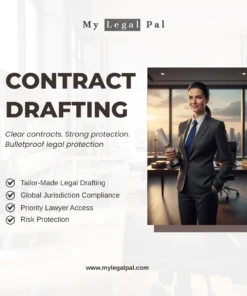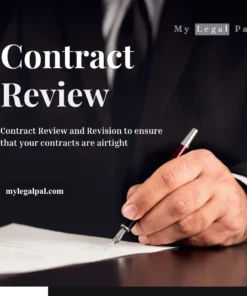A Mediation Agreement is a legally binding document that sets out the terms under which parties agree to resolve disputes through mediation rather than litigation. It reflects the parties’ intention to collaborate in good faith with the assistance of a neutral mediator. Unlike arbitration, where the decision of the arbitrator is binding, mediation empowers the parties themselves to reach a mutually acceptable resolution.
Mediation agreements are commonly used in commercial disputes, partnership conflicts, employment disagreements, family business disputes, and contractual issues. The main objective is to avoid lengthy court proceedings and find a cost-effective, amicable settlement.
Key features of a mediation agreement include:
-
Identification of the parties involved
-
Appointment of the mediator
-
Confidentiality provisions
-
Rules governing the mediation process
-
Allocation of costs and fees
-
Binding effect of any settlement reached
MEDIATION AGREEMENT FREE TEMPLATE
This Mediation Agreement (“Agreement”) is made and entered into on [Date] by and between:
[Party A Name], a company/individual having its principal address at [Address], hereinafter referred to as “Party A”;
AND
[Party B Name], a company/individual having its principal address at [Address], hereinafter referred to as “Party B.”
(Individually, a “Party,” and collectively, the “Parties.”)
1. Recitals
WHEREAS, a dispute has arisen between the Parties concerning [brief description of the dispute];
WHEREAS, the Parties desire to resolve their differences in a cooperative and confidential manner through mediation rather than litigation or arbitration;
NOW, THEREFORE, in consideration of the mutual covenants set forth herein, the Parties agree as follows:
2. Appointment of Mediator
2.1 The Parties jointly appoint [Mediator’s Full Name] (“Mediator”) as the neutral third-party mediator.
2.2 The Mediator shall disclose any conflict of interest or prior relationship with either Party. The Parties shall have the right to approve or reject the Mediator’s appointment before the commencement of the proceedings.
2.3 If the appointed Mediator is unable to serve or continue, the Parties shall mutually agree on a replacement Mediator.
3. Objectives of Mediation
3.1 The goal of the mediation is to reach a voluntary settlement of the dispute.
3.2 The Mediator shall facilitate negotiations, assist in identifying issues, and encourage constructive solutions, but shall not impose a decision or binding award.
4. Role and Responsibilities of the Mediator
4.1 The Mediator shall act impartially and independently at all times.
4.2 The Mediator may meet jointly with the Parties or separately in caucus sessions.
4.3 The Mediator shall not be compelled to testify in any judicial, arbitral, or administrative proceeding regarding matters disclosed in mediation.
4.4 The Mediator may suggest options for settlement, but the Parties shall retain full control over the outcome.
5. Confidentiality
5.1 All oral and written communications, documents, and disclosures made during mediation shall remain strictly confidential.
5.2 Neither Party may use mediation communications as evidence in any future proceedings, except for the settlement agreement itself.
5.3 The Mediator and the Parties shall not disclose information to any third party unless required by law, regulatory order, or with written consent of both Parties.
6. Mediation Procedure
6.1 Scheduling: The mediation shall commence on [Date] at [Location/Online Platform] and may continue until concluded by settlement or termination.
6.2 Submissions: Each Party shall provide the Mediator with a written statement of its position, relevant documents, and desired outcomes at least [X] days prior to the mediation session.
6.3 Participation: Each Party shall ensure that representatives attending the mediation have full authority to settle the dispute.
6.4 Process Control: The Mediator shall decide the order of presentations, breaks, and private caucuses, in consultation with the Parties.
7. Costs and Fees
7.1 The Mediator’s fees shall be [insert amount/hourly rate/flat fee].
7.2 The Parties agree to share the Mediator’s fees, venue charges, and administrative expenses equally, unless otherwise agreed in writing.
7.3 Each Party shall bear its own costs, including legal fees, expert costs, and witness expenses.
8. Settlement Agreement
8.1 If the Parties reach a resolution, the terms shall be reduced to writing in a Settlement Agreement.
8.2 The Settlement Agreement shall be signed by both Parties and the Mediator, and shall be legally binding upon execution.
8.3 If partial settlement is reached, the unresolved issues may be referred to arbitration or litigation, depending on the Parties’ prior agreement.
9. Termination of Mediation
Mediation shall be deemed terminated upon the occurrence of any of the following:
-
The execution of a Settlement Agreement;
-
A written declaration by the Mediator that further mediation is unlikely to resolve the dispute;
-
A written notice by either Party expressing its intent to withdraw from mediation.
10. Good Faith and Cooperation
10.1 The Parties agree to participate in mediation in good faith, with an intent to resolve their dispute amicably.
10.2 Neither Party shall engage in delay tactics, coercion, or misrepresentation during the mediation.
11. Governing Law and Jurisdiction
This Agreement shall be governed by and construed in accordance with the laws of [Applicable Jurisdiction]. Any disputes not resolved through mediation shall be subject to [Arbitration/Courts of specified jurisdiction].
12. Entire Agreement
This document constitutes the entire agreement between the Parties with respect to mediation and supersedes all prior oral or written understandings.
IN WITNESS WHEREOF, the Parties hereto have executed this Mediation Agreement on the date first written above.
Party A: _________________________
Name:
Designation:
Date:
Party B: _________________________
Name:
Designation:
Date:
Mediator: _________________________
Name:
Date:
FAQs on Mediation Agreements
1. Is a mediation agreement legally binding?
The mediation agreement itself sets the framework for mediation. However, the settlement reached through mediation becomes binding once signed by both parties.
2. How is mediation different from arbitration?
In arbitration, the arbitrator delivers a binding award. In mediation, the mediator facilitates discussions, but the decision rests with the parties.
3. Can mediation agreements be used for business disputes?
Yes. Mediation agreements are commonly used in commercial disputes, joint ventures, shareholder disagreements, and supplier-customer conflicts.
4. What happens if mediation fails?
If mediation does not result in a settlement, the parties are free to pursue arbitration or court proceedings, depending on the dispute resolution clause in their contract.
5. Who pays for mediation costs?
Usually, both parties share the mediator’s fees and other costs equally unless they agree otherwise.
A well-drafted Mediation Agreement ensures clarity, confidentiality, and fairness during dispute resolution. It saves time, protects relationships, and helps parties avoid unnecessary legal battles.
At My Legal Pal, we specialize in drafting and reviewing mediation agreements, arbitration clauses, and other commercial contracts to protect your interests. If you need professional legal assistance, connect with us today at My Legal Pal.


